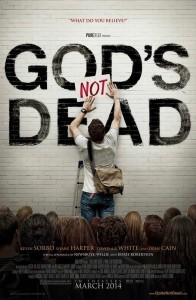From Geek Goes Rogue TV Editor Zach Lorton, as told to by the giant CD rack staring him in the face…
One thing I love to do is engage in well-thought conversations. Sometimes, this manifests itself as inadvertent instigation, especially on social media. Such was the case last week, when I was taking my nephew to a waterpark, and we were channel flipping on the radio. What I heard disturbed me, so I posted to Facebook about it…
One reason I don’t listen to Christian radio: while channel surfing, I heard a worship song that was an obvious ripoff of Mumford & Sons. Look, if you’re inspired to write a folk song, don’t actually engineer your song to be a carbon copy of an already-famous band whose sound you can’t emulate no matter how badly you want to. To make matters worse, you’re using a worship song as a marketing and positioning tool, and it kind of hacks me off. Stop it.
 I was pretty ticked, honestly, that this happened. To me, it’s one thing to try and create a sound you find appealing. How many artists are out there that sound “kind of” like someone else? Everything seems to be derivative of an artist that came before in some way, with very few exceptions, especially in pop music. Take into account the recent news, where Robin Thicke is suing Marvin Gaye’s family to protect his song “Blurred Lines” from copyright infringement lawsuits, in a strange twist of what we usually see. It’s nearly impossible to create music that doesn’t smack of something familiar, something you’ve heard before, especially when the intention is to create something unique.
I was pretty ticked, honestly, that this happened. To me, it’s one thing to try and create a sound you find appealing. How many artists are out there that sound “kind of” like someone else? Everything seems to be derivative of an artist that came before in some way, with very few exceptions, especially in pop music. Take into account the recent news, where Robin Thicke is suing Marvin Gaye’s family to protect his song “Blurred Lines” from copyright infringement lawsuits, in a strange twist of what we usually see. It’s nearly impossible to create music that doesn’t smack of something familiar, something you’ve heard before, especially when the intention is to create something unique.
It’s another thing entirely to create a soundalike song in a deliberate attempt to cash in. This song — which, I have to admit, I don’t know the title or the artist, despite my best efforts to Google “Christian song that sounds like Mumford & Sons” — crosses the line of merely sounding like a certain artist into the realm of trying to sound exactly like an artist who just happens to be at the peak of their popularity. However, an even grosser transgression is that the song in question was a worship song.
Recently, GGR co-editor Alan Atchison posted his own article about his thoughts towards the Christian music “genre” (a term I use very loosely), and it generated a miniature firestorm of feedback. If you haven’t read it, it’s worth your time. In this article, though, I’m going to try and cover some ground he didn’t talk about in there, mostly because of this singular experience I had on the road.
And before I dive further into why I was incensed enough to post to Facebook about this travesty whilst driving my 10-year-old nephew around, let’s take a look at a few of the responses my Facebook post generated. Some of it surprised me.
…Zach, I completely agree. Christians are a large demographic and have proven themselves more than willing to spend money on entertainment built to our worldview … The problem is that most Christian entertainment is horrible. The music, books, movies, etc, are so poorly constructed as to stand whole levels below secular entertainment. Sure, there are exceptions, but there’s a good reason I rarely go looking for Christian novels or Christian rock.
…Nothing like attempted emulation over originality. #stopitrendcollective
…I’m going to be odd girl out on this one because I enjoy today’s Christian music very much. That’s not to say that I support blatant plagiarism. I listen to music that makes me feel something and there is value to that. Many songs, poorly constructed or not have helped me through a moment, gave me a new perspective, lifted me out of a crappy mood or helped me feel closer to God. Mumford & Sons is definitely unique, but their originality is not something that makes it into mainstream regularly. The masses respond to the cookie cutter, easily palatable, put a shiny bow on it and watch it go platinum music. That doesn’t make it horrible, it makes it marketable and has produced the hooks we continue to love to sing along with.
…Why focus on this? Name an uninspired artist? Name an artist who hasn’t covered another? Christian music encompasses all genres. Why throw stones at artist who may be taking secular rhythms and pushing them toward the kingdom? Then again social media is where we vent opinion now a days. But with open forum opinions come questions.
…So what do you think of weird Al, lol
 To answer that last post, I am and have always been a huge fan of “Weird Al” Yankovic. Interestingly enough, some of his most memorable, well-written, and outright funniest songs have been his originals, not his parodies. Parody has its place, but the first time I heard “One More Minute”, I was in the car with my family, and we couldn’t stop laughing if we tried. My father almost had to pull over. But parody is when a musician mimics another’s music in an effort to be intentionally funny, and what I heard was nowhere near parody.
To answer that last post, I am and have always been a huge fan of “Weird Al” Yankovic. Interestingly enough, some of his most memorable, well-written, and outright funniest songs have been his originals, not his parodies. Parody has its place, but the first time I heard “One More Minute”, I was in the car with my family, and we couldn’t stop laughing if we tried. My father almost had to pull over. But parody is when a musician mimics another’s music in an effort to be intentionally funny, and what I heard was nowhere near parody.
I didn’t agree with everyone’s comments, nor did I see the sense in responding to each one. But a couple of them struck me sideways. The comment that talked about artists taking “secular rhythms” came from someone that, I believe, missed the point of what I was saying. I ended up getting into a messaging conversation with one of my detractors; this person said I sounded bitter, and asked if I was still involved at my church doing music ministry.
Look, there’s a difference between worshipping God and creating music for consumers. Unfortunately, Christian music — which includes worship music — has turned into a consumer genre in which everything has been manufactured to sound the same, and the song in question was the most disturbing example to me of a continued trend.
I must confess, I HATE Christian radio. There are always exceptions, but more than ever, Christian acts signed to labels that have major distribution to radio are sounding more and more similar by the day. They have been homogenized to try to appeal to as many people as possible. I understand the reasoning for this: 1.) the artist wants to reach as many people for the Kingdom of God as they can, and 2.) the record company wants the artist to make money and be profitable.
Fine. If that’s what you’re going for, THEN WRITE YOUR OWN @#*%!? SONGS. #SimmerDownNow
What I heard on the radio that day was an example of a song that was engineered specifically to cash in on a sound made popular by someone else. The tragedy in all this is that the lyrics to the song were actually pretty good, but the fact that the song was a stone cold ripoff of a song by a popular mainstream artist, down to the 4-on-the-floor bass drum and tambourine hits, kept me from receiving the lyrics. The music, while well intended, became a distraction. To top it off, it was supposed to be a worship song. How sad.
I was offended as a musician. After I thought about it, I was offended as a Christian. If this is what passes for Christian music these days, it sucks. And it sucks hard.
Now, I could list off dozens of artists who maintained their musical and lyrical integrity throughout their careers, playing music that has done more to lead people to the kingdom than a manipulative, passionless, Velveeta-like product that I heard that day could ever do. Why? Because people have their own B.S. meters, and they can spot a fake from miles away.
Here’s the unfortunate thing: back in the mid-to-late 1990s, a surge of Christian bands making truly innovative and unique music grew from seemingly out of nowhere. The rise of Tooth and Nail Records gave hope to musicians who wanted to make art for art’s sake, and a few dozen bright stars were born out of that surge. Plumb, Switchfoot, and Five Iron Frenzy were among them, all artists who enjoyed success outside the Christian music arena, and deservedly so.  Saviour Machine played gothic metal with a heavy emphasis on theatrics in their performances, and they created a huge following in Europe that still holds strong today, 12 years after their last album was released. Michael Knott, Lost Dogs, The Violet Burning, and other similar artists have always been pegged as “too Christian for mainstream radio, to mainstream for Christians”, and have had to struggle to find audiences. But decades on, they are still recording, still touring, and still putting out quality music.
Saviour Machine played gothic metal with a heavy emphasis on theatrics in their performances, and they created a huge following in Europe that still holds strong today, 12 years after their last album was released. Michael Knott, Lost Dogs, The Violet Burning, and other similar artists have always been pegged as “too Christian for mainstream radio, to mainstream for Christians”, and have had to struggle to find audiences. But decades on, they are still recording, still touring, and still putting out quality music.
Today, Cornerstone Festival is shut down. We see large Christian music festivals featuring little more than major label acts on their rosters. Tooth and Nail Records now has more artists in their archives than active artists they currently represent. Originality has been flushed out of the industry that represents Christian artists, and we see a lack of innovation as a result.
However, some hope has been glimmering from the ashes. Several years ago, Derek Webb, along with a collective of musicians, started NoiseTrade.com, a website that allows artists to share their music with the public. People can download whatever music is offered for free by posting a link to Twitter or Facebook, and they can leave a tip for the artist if they like. The amount of talent featured on this site is staggering, and I have discovered more great artists through this site than I can count. Not every artist is a Christian artist, but when the site started out, most of them were. Now it is its own community of artists that make art for art lovers, not mere music consumers. Other sites like this, as well as the explosion of crowdfunding sites like Kickstarter and IndieGoGo, have allowed artists to self-produce their own music, thus maintaining their artistic integrity, even if it means their audiences may be smaller.
Now, probably the biggest reason I was offended as both a musician and a Christian at this song is because it made me think of the standards that the Christian music industry has allowed to stand. If record labels are okay with putting out product that sounds nearly the same as every other act already on radio, then they have set a standard for artistic mediocrity. This bothers me on a cellular level. We are loved by the Creator of the universe, made in His image, with the capacity to create and a call to excellence and quality in everything that we do. If the Christian music currently on the airwaves is the apex of our musical creativity as God’s people, then we are in huge trouble, and — in my honest opinion — we don’t deserve to identify ourselves with Christ.
Why are we so afraid to embrace something truly authentic? Why do we resort to the lowest common denominator of consumerism when it comes to the music we listen to, rather than engaging with what the artist is trying to communicate? When did worship music become a genre? And most importantly, how do we overcome this problem?
First off, I suggest that if you’re like me, you take some time over the next couple of weeks and research where to find new music that you enjoy, even if the lyrics aren’t blatantly Christian or the the artist is not a Christian artist. Open your eyes to what’s available. And you may very well like the stuff that’s on Christian radio. If you do, I don’t fault YOU, but rather, the machine that perpetuates the bland over the gifted.
Secondly, the next time you hear a worship song — whether on the radio, in church, on your CD player or mp3 player — try and engage with the song. The song was written to be a way for the author to minister to the Lord, so don’t let it pass by as something you’ve heard several times before, and don’t let it go unnoticed by your soul. Look into the lyrics that you hear, and see if you can relate to what the song is saying.
Third, contact your local Christian radio station — in writing. Even if you don’t listen to Christian radio, take the time to write them. Tell them what you think is good about what they’re doing. Tell them what you think they could do better. Remind them that what they put over the airwaves is, in part, representative of the Church and the standards we live by. Then pray that they will choose music that will reach not only the Christian community, but also the communities they don’t currently reach.
Fourth, promote the artists whose music you love, especially if they represent the high standards that we, as Christians, are supposed to uphold. The best advertising is always word-of-mouth, and many great movements have grown from grassroots beginnings.
More than anything, I hope and pray that Christian music grows its balls back. We need to take more risks, be more authentic, and take more chances than we have been over the last few years. The Church, as well as the mainstream, deserves our best efforts, in the same manner that God requires our best. And the rest of the world, as we full well know, will always be watching.











